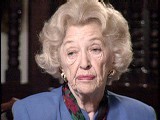<< Previous | Displaying results 2281-2290 of 6705 for "" | Next >>
-
Irene Hizme and Rene Slotkin describe medical experiments
Oral HistoryIrene Hizme and Rene Slotkin, Jewish twins born in 1937 in Czechoslovakia, were deported with their mother to Theresienstadt, then Auschwitz. They describe the medical experiments to which they were subjected. Benno Müller-Hill, professor of genetics, University of Cologne, comments on Nazi medical experiments. Simon Rosenkier, a Polish Jew who was deported to Auschwitz-Birkenau, describes medical experiments at Auschwitz. [Photo credits: Getty Images, New York City; Yad Vashem, Jerusalem;…
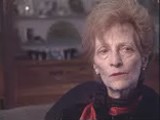
-
Paul Eggert, Helga Gross, and Dorothea Buck describe forced sterilization
Oral HistoryPaul Eggert was categorized as "feeble-minded." At age 11, he was institutionalized and sterilized without his knowledge. Helga Gross attended a school for the deaf in Hamburg, Germany. She was sterilized in 1939, aged 16. At age 19, Dorothea Buck was diagnosed as schizophrenic and sterilized without her knowledge. [Photo credits: Getty Images, New York City; Yad Vashem, Jerusalem; Max-Planck-Institut für Psychiatrie (Deutsche Forschungsanstalt für Psychiatrie), Historisches Archiv, Bildersammlung GDA,…
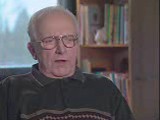
-
Benno Müller-Hill discusses genetics and eugenics
Oral HistoryBenno Müller-Hill, professor of Genetics, University of Cologne, and author of Murderous Science, discusses genetics and eugenics. [Photo credits: Getty Images, New York City; Yad Vashem, Jerusalem; Max-Planck-Institut für Psychiatrie (Deutsche Forschungsanstalt für Psychiatrie), Historisches Archiv, Bildersammlung GDA, Munich; Bundesarchiv Koblenz, Germany; Dokumentationsarchiv des österreichischen Widerstandes, Vienna; Kriemhild Synder: Die Landesheilanstalt Uchtspringe und ihre Verstrickung in…
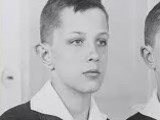
-
John Dolibois describes attitude of captured Nazi leaders
Oral HistoryJohn Dolibois immigrated to the United States in 1931 at the age of 13. After graduating from college, Dolibois joined the 16th Armored Division of the US Army. Due to his German language skills, he became involved in military intelligence. He returned to Europe in this capacity toward the end of World War II. Dolibois interrogated German prisoners of war, including leading Nazis, in preparation for the postwar trials of war criminals. He was later appointed US ambassador to Luxembourg, his birthplace.
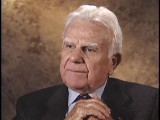
-
John Dolibois describes interrogating captured Nazi officials
Oral HistoryJohn Dolibois immigrated to the United States in 1931 at the age of 13. After graduating from college, Dolibois joined the 16th Armored Division of the US Army. Due to his German language skills, he became involved in military intelligence. He returned to Europe in this capacity toward the end of World War II. Dolibois interrogated German prisoners of war, including leading Nazis, in preparation for the postwar trials of war criminals. He was later appointed US ambassador to Luxembourg, his birthplace.
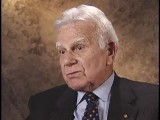
-
Edward Adler recalls forced labor and conditions in the Sachsenhausen camp
Oral HistorySeveral of the IMT defendants were charged with exploiting concentration camp inmates for forced labor under harsh conditions, like those described here by Holocaust survivor Edward Adler. Edward was born to a Jewish family in Hamburg. In 1935, the Nuremberg Laws prohibited marriage or sexual relations between German non-Jews and Jews. Edward was then in his mid-twenties. Edward was arrested for dating a non-Jewish woman. Classified as a habitual offender, he was later deported to the Sachsenhausen…
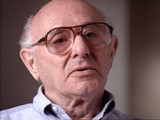
-
Belle Mayer Zeck reflects upon the sentences given to leaders of the economy
Oral HistoryBelle Mayer trained as a lawyer and worked for the General Counsel of the US Treasury, Foreign Funds Control Bureau. This bureau worked to enforce the Trading With the Enemy Act passed by Congress. In this capacity, Mayer became familiar with the German I. G. Farben chemical company, a large conglomerate that used slave labor during World War II. In 1945, Mayer was sent as a Department of Treasury representative to the postwar London Conference. She was present as representatives from the Allied nations…
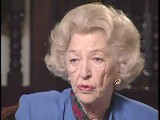
-
Belle Mayer Zeck describes difficult working conditions during the Nuremberg trials
Oral HistoryBelle Mayer trained as a lawyer and worked for the General Counsel of the US Treasury, Foreign Funds Control Bureau. This bureau worked to enforce the Trading With the Enemy Act passed by Congress. In this capacity, Mayer became familiar with the German I. G. Farben chemical company, a large conglomerate that used forced labor during World War II. In 1945, Mayer was sent as a Department of Treasury representative to the postwar London Conference. She was present as representatives from the Allied nations…
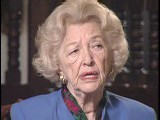
-
Belle Mayer Zeck describes working conditions and staffing at Nuremberg during the postwar trials
Oral HistoryBelle Mayer trained as a lawyer and worked for the General Counsel of the US Treasury, Foreign Funds Control Bureau. This bureau worked to enforce the Trading With the Enemy Act passed by Congress. In this capacity, Mayer became familiar with the German I. G. Farben chemical company, a large conglomerate that used slave labor during World War II. In 1945, Mayer was sent as a Department of Treasury representative to the postwar London Conference. She was present as representatives from the Allied nations…
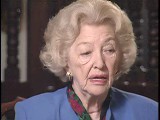
-
Belle Mayer Zeck describes the impact of the Nuremberg trials on her
Oral HistoryBelle Mayer trained as a lawyer and worked for the General Counsel of the US Treasury, Foreign Funds Control Bureau. This bureau worked to enforce the Trading With the Enemy Act passed by Congress. In this capacity, Mayer became familiar with the German I. G. Farben chemical company, a large conglomerate that used slave labor during World War II. In 1945, Mayer was sent as a Department of Treasury representative to the postwar London Conference. She was present as representatives from the Allied nations…
